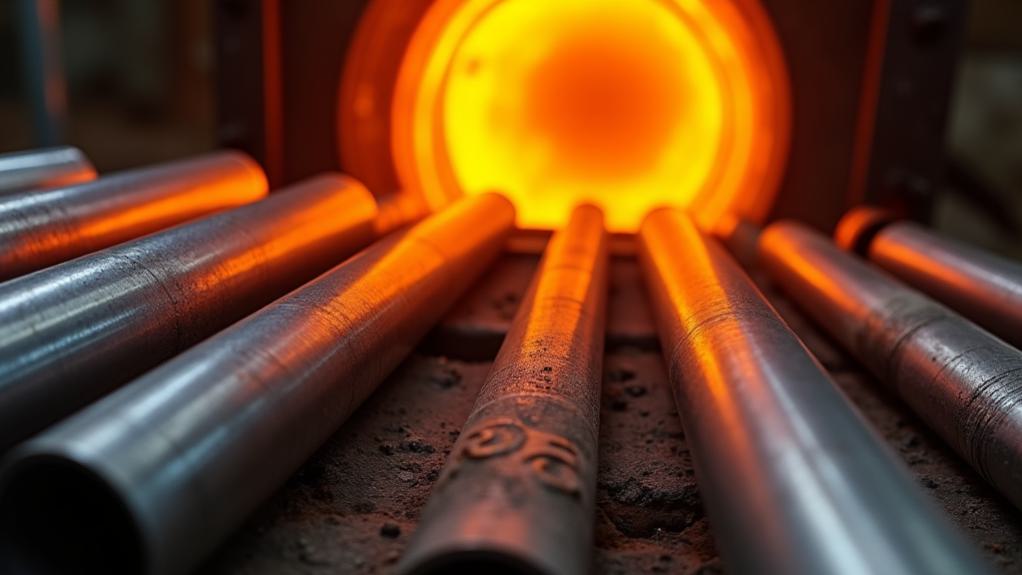
For high-temperature bellows, you'll want to evaluate three top-performing materials: Inconel alloys, Stainless Steel 321, and Hastelloy grades. Inconel alloys offer exceptional strength and resistance to oxidation at temperatures exceeding 1000°C. Stainless Steel 321, a titanium-stabilized austenitic grade, provides excellent corrosion resistance and thermal stability up to 900°C. Hastelloy grades, nickel-chromium-molybdenum superalloys, excel in extreme environments with superior resistance to corrosion and stress at high temperatures. Each material maintains its mechanical properties under intense heat, ensuring longevity and reliability in demanding applications. Understanding the specific advantages of these materials will help you make an informed choice for your high-temperature bellows needs.
Inconel Alloys
In light of high-temperature applications, Inconel alloys stand out as premier materials for bellows construction. These nickel-chromium-based superalloys offer exceptional strength and resistance to oxidation, corrosion, and thermal fatigue.
You'll find that Inconel properties include excellent creep resistance and stability at extreme temperatures, making them ideal for demanding environments.
When you're designing bellows for aerospace, nuclear, or chemical processing industries, Inconel alloys should be at the top of your list. Their ability to maintain mechanical properties at temperatures exceeding 1000°C sets them apart from other materials.
You'll appreciate their resistance to chloride stress corrosion cracking and pitting, essential for applications involving aggressive media.
Inconel applications in bellows include exhaust systems, heat exchangers, and pressure vessels. You'll benefit from their low thermal expansion rates, which minimize stress during thermal cycling.
The alloys' high ductility allows for complex bellows shapes without compromising integrity. By choosing Inconel for your high-temperature bellows, you're joining a community of engineers who prioritize performance and reliability in the most challenging conditions.
Stainless Steel 321
Stainless steel 321, a titanium-stabilized austenitic grade, offers a strong solution for high-temperature bellows applications. You'll find that this alloy's composition provides excellent corrosion resistance and thermal stability, making it ideal for use in extreme environments.
The addition of titanium prevents sensitization, guaranteeing the material maintains its integrity even after prolonged exposure to high temperatures.
When you're designing bellows for high-temperature operations, you'll appreciate SS321's ability to resist oxidation and scaling up to 900°C (1652°F). Its austenitic structure provides good ductility, allowing for the necessary flexibility in bellows design.
You'll also benefit from its resistance to intergranular corrosion, which is essential in maintaining the bellows' performance over time.
SS321's strength-to-weight ratio and weldability make it a preferred choice among engineers in your field. You'll find it's widely used in aerospace, chemical processing, and power generation industries.
When specifying materials for your high-temperature bellows, consider SS321's balanced properties of strength, corrosion resistance, and formability. It's a reliable option that'll help guarantee your bellows perform consistently in demanding thermal environments.
Hastelloy Grades
Delving into Hastelloy grades reveals a family of nickel-chromium-molybdenum superalloys engineered for extreme environments.
These alloys excel in high-temperature bellows applications due to their exceptional resistance to corrosion, oxidation, and stress at heightened temperatures. You'll find Hastelloy properties particularly suited for harsh industrial settings where standard alloys fail.
When considering Hastelloy grades for your high-temperature bellows, focus on these key types:
- Hastelloy C-276: Offers superior resistance to pitting and crevice corrosion
- Hastelloy X: Excels in oxidizing environments up to 1200°C
- Hastelloy N: Designed for molten fluoride salt applications
- Hastelloy B-3: Provides exceptional resistance to reducing environments
Hastelloy applications in bellows manufacturing utilize the alloys' unique combination of strength and ductility.
You'll benefit from their ability to maintain mechanical properties at high temperatures, ensuring longevity and reliability in your systems.
When selecting a Hastelloy grade, consider the specific corrosive agents, temperature range, and mechanical stresses your bellows will encounter.
In Summary
You've examined three top materials for high-temperature bellows: Inconel alloys, Stainless Steel 321, and Hastelloy grades. Each offers unique advantages in extreme environments. When selecting a material, you'll need to take into account specific operating conditions, including temperature range, corrosive elements, and cyclic stresses. Evaluate the cost-benefit ratio of each option, factoring in initial expense and long-term performance. Remember, the best choice will depend on your application's precise requirements and constraints.
© Copyright 2024. All RIghts Reserved
